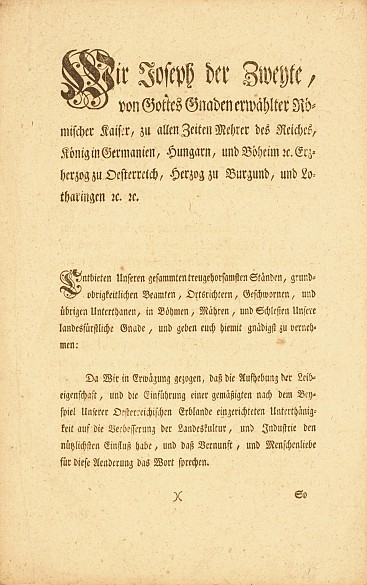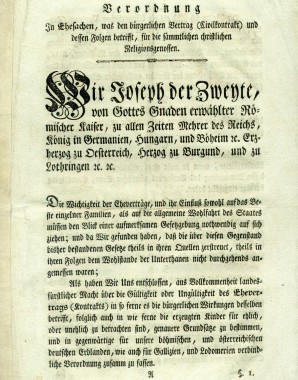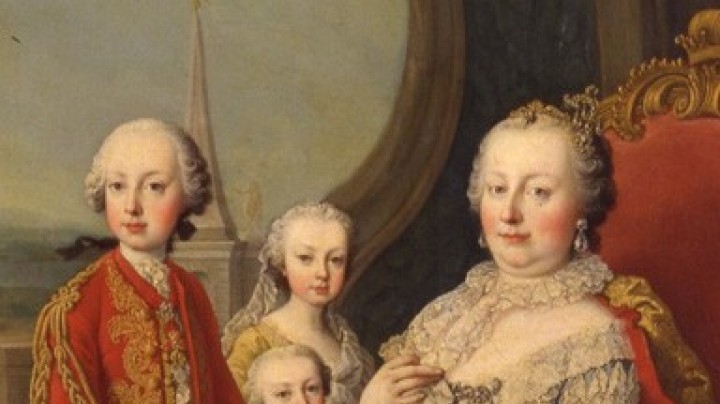Joseph II: Reformist emperor or enlightened despot?
Joseph II developed an idealism bordering on fanaticism for the common weal of his subjects, but often chose the wrong means to implement his reforms. Many of his measures were experienced as tyranny by those whose welfare they were intended to improve.
Joseph II to State Chancellor KaunitzConvinced to my core of the integrity of my intentions, I have the strength to hope that after my death posterity will think of my deeds and examine my aims more favourably, more impartially and consequently more equitably than my contemporaries.
Satirical verse penned on the death of Joseph II.Der Bauern Gott, der Bürger Not, des Adels Spott liegt auf den Tod
On his deathbed lies the peasants’ God, the affliction of the burghers and the scorn of the nobility
It was not until the death of Maria Theresa in 1780 that Joseph became ruler in his own right. Now his long-cherished plans were put into practice at precipitate speed. In the ten years of life that remained to him he put all his energies into implementing a comprehensive and radical programme of reforms. However, he often went about this too hastily and without considering the mood of the people.
There now follows a brief description of his most important reforms.
The Tolerance Patent of 1781, followed by further decrees concerning the freedom of religion, improved the position of Protestants, Orthodox Christians and Jews, providing for a gradual removal of the limitations on the practice of religion, place of residence and freedom of movement. Joseph opened access to the universities and trades for non-Catholics. In this he was acting less from philanthropic motives than on utilitarian principles, feeling that these sectors of the population should not to be excluded on religious grounds from contributing to the prosperity of the state.
In all of this the primacy of the Catholic Church remained untouched. Non-Catholics continued to be second-class citizens. Thus it was permitted for non-Catholic congregations to erect their own places of worship, but these were not permitted to be visible from the street. Nevertheless Joseph was seen as a great liberator, particularly by the Jews. He ushered in Jewish emancipation and the rise of the Jewish middle class that would eventually become one of the mainstays of cultural and economic life in the Habsburg monarchy.
Another contentious issue was ecclesiastical reform. Here it was the dissolution of the monasteries in particular that caused uproar. All ecclesiastical institutions that were dedicated exclusively to the contemplative life and did not engage in any activities that contributed to the general good, such as education, tending the sick or pastoral care, were closed down. This affected around a third of all religious foundations at the time. Their assets were used to create a Religious Fund with which new parishes could be endowed. The new diocesan and parish regulations led to the founding of hundreds of new parishes in order to ensure there was a uniform network of parishes. The boundaries of the bishoprics were also altered to accommodate these new foundations and new dioceses created.
All these measures were put in place to bind the Church more closely to the state. Papal ordinances first had to be approved by state committees, while the training of priests was only permitted in state-run general seminaries. The secular priests thus became an extension of state authority and were known as ‘officials in black cassocks’.
Joseph’s ecclesiastical reforms met with considerable resistance. The unmitigated rationalism of reformist Catholicism that manifested itself in the closure of churches and monastic foundations, the simplification of church ceremony and the abolition of pilgrimages, religious feasts and other forms of popular piety particularly affected the simple people, who were mostly still deeply rooted in a traditional social environment, and was misunderstood. Resistance also came from many of the clergy, with only a minority supporting the reformist measures. Nonetheless, even when Pope Pius VI travelled to Vienna in 1782 in order to persuade the emperor to reconsider his policies, the emperor refused to change course.
Another level on which Joseph sought to introduce reform was the creation of a civil society. He abolished censorship, a measure that led to a flowering in literary production but also opened the floodgates to polemical writings. The emperor was virtually encouraging public criticism and evidently tolerated it even when it focused on his own person.
Joseph also followed western European models in systematically extending welfare institutions. First and foremost among these was the General Hospital in Vienna, founded in 1784 and one of most modern institutions of its kind in Europe at the time. Other measures to raise professional standards among physicians led to a first flowering of the Viennese school of medicine which was to attain international standing during the nineteenth century.
Numerous economic reforms fostered a boom in commerce and trade. This eventually led to the establishment of an economically robust and self-confident middle class that was for the first time able to free itself from the straits of the feudal system. Culture blossomed in Vienna, one example of this being Mozart, who was able to make a living as a freelance musician in the imperial capital since the city’s flourishing concert life was no longer exclusively in the hands of the court and nobility.
One important legacy of the Josephinian epoch is the Austrian bureaucratic state. The establishment of an efficient state bureaucracy had begun under Maria Theresa, who had recognized the inadequacy of the outdated system of estates-based administration. The state was to have mechanisms at its disposal that would ensure it had access to each and every subject as a tax-payer or soldier, something that today is taken for granted but at that time was a complete novelty. Up to that time local administration had been in the hands of the Estates and feudal landlords. The ideal official in Joseph’s view was a cog in the machinery of administration that worked according to the precise provisions of the law, selfless and free of prejudice. This gave birth to the ethos of Austrian officialdom, which together with the army was to be one of the cornerstones of the Monarchy until its fall.
Joseph’s conception of the perfect state was geared towards a centralized nation state that was intended to be a unified society of citizens. In keeping with this notion, special courts and the legal privileges of the nobility were abolished.
The emperor also introduced wide-ranging reforms affecting the rural population. The Monarchy was still largely an agrarian state, and the majority of the populace lived in archaic conditions, in servitude and circumscribed by feudal prerogatives. Thanks to the abolition of serfdom in 1781 the degrading status of personal servitude which still existed in certain parts of the Monarchy among the rural population was eliminated. However, there was a reluctance to abolish the manorial system itself (this would not finally be achieved until 1848). Peasants continued to be subject to aristocratic and ecclesiastical landlords.
Several interventions in the legal circumstances of the manorial system and the introduction of a fixed rate of taxes led to the curtailing of dues and obligatory labour. For the first time land owned by the aristocracy was subject to a property tax.
Many of these legal provisions met with bitter resistance. In Hungary and the Netherlands people were on the verge of open revolt. It was not only dyed-in-the-wool traditionalists that saw themselves threatened by the flood of reforms decreed by Vienna and stood up against what they felt to be an arbitrary and insensitive attempts to subject the different parts of the Empire to the same set of standards and laws.
The reaction to the centralism that Joseph was attempting to enforce formed the spark that was to trigger the emergence of a modern sense of national identity within the territories of the multi-national state. An example of this was Joseph’s wish to establish German as the sole language of administration and communication. Here the emperor was not motivated by ideas of cultural imperialism but by his vision of simplifying state administration. However, in reaction people began to reconsider and identify with local languages, prompting research into the geography, history and culture of the Crown Lands.
At the end of his life, in poor health and exhausted by his enormous workload, Joseph had to admit that his efforts had largely been in vain. On his deathbed he felt impelled to revoke many of his reforms. His life lay in ruins before him when he died in Vienna at the age of 49 on 20 February 1790.














